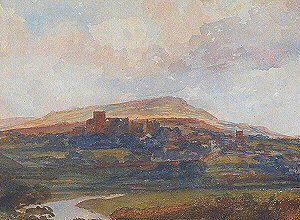


I’ve been thinking about Richard III for a long time. I was an only child who lived in the country in a house well supplied with plenty of interesting books. I read a lot. There was a bi-weekly visit to the library with my mother, who voraciously read everything—from S/F and literary fiction, to mysteries and political commentary, to best sellers and historical biography. When I read Josephine Tey’s The Daughter of Time, I learned an important lesson that everyone interested in studying the past learns sooner or later: History is written by the victors, and therefore, the thumbnail version, which we get in schools, rarely resembles the truth. I became an ardent Ricardian.

Henry Tudor, the man who defeated Richard and founded the famous dynasty, was a sharp politician. It may have been 1486, but he employed talented spin doctors, men like Bishop John Morton, who could have taught Karl Rove a thing or two about smearing adversaries. The results of Henry’s “Big Lie” strategy came to fruition many years later in Shakespeare’s engaging, rip-roaring melodrama. For centuries this has been the “Richard III” most people know.
In the ‘90s, I had a Ricardian flashback, familiar to anyone with OCD. I joined a now defunct ‘net group called “Later Medieval Britain” and began talking about the king and the Yorkist era with interested people who lived all over the world—from Australia, to Britain, to the US. Most knew a great deal more about the period and the newly available ancient sources than I did. I began to research again. At the same time I began to reconsider the knight- in-shining-armor Richard I’d constructed. After all, as a child I was naturally more of a fan than an historian.
I’d become involved, while writing Mozart’s Wife and My Mozart, in an attempt to enter the mindset of my subjects by immersing myself in 18th Century contemporary thought. I’d used letters, diaries and novels, such as Richardson’s Clarissa, Sterne’s Tristan Shandy and even Cleveland’s Fanny Hill. For the later Middle Ages, I discovered lots of newly available sources, and a few of these I’ve listed in my bibliography. Besides that, the members of LMB were amazingly willing to share and give me a push in the right direction as I dug ever deeper. For me, anyway, there was a lot of new information to consider.
It’s a long, long way from 1780 to 1480. The medieval POV I tried to enter when I wrote Roan Rose is not much like ours. There was a rigidly hierarchical social structure and a world view which wouldn’t have been unfamiliar five hundred years earlier. The class into which a person was born was destiny, although this was not as impermeable in England as it was in the rest of Europe. Medieval people were hard-nosed and their lives were short. As well as the strictures of Class, gender was another unrelenting form of destiny. Most women were married and “breeding” by the time they reached their early teens.
Even for those living at the top, the ones with good food and physical comforts, life could be tough. Adulthood began early. For instance, by the time Richard was fourteen, he was making life-altering decisions. He chose loyalty to his brother the King over loyalty to his mentor Warwick, in whose grand household he’d received his knightly training. The bait Warwick dangled was not inconsiderable, either, for this was his lovely cousin Anne, who was one of the richest heiresses in England.
Richard’s brother George, contrastingly, took Warwick’s offer and married Anne’s sister, Isabel. When Warwick – not nicknamed “Kingmaker” for nothing – unseated Richard’s brother, King Edward, and replaced him with the rival Lancastrian claimant, George supported his father-in-law. Richard fled with his older brother the King into the lowlands where their sister Margaret, who had married Duke Charles of Burgundy, could protect them. During this time of exile, he and his siblings got busy setting a conspiracy afoot to entice their wayward brother George to return to their side.

Before he was nineteen, Richard led troops in two decisive battles, Barnet and Tewkesbury, which would restore his brother Edward to the throne. He led his men with bravery and coolness beyond his years. In the aftermath of Tewkesbury, he and the family’s staunch Yorkist ally, John, Duke of Norfolk, were the judges who delivered death sentences upon captured Lancastrian nobles. (These men had been lured from sanctuary with false promises of safe passage). Sixteen noblemen—many of them familiars and most of them cousins--were beheaded that day, with the two Dukes as witnesses. After this blood bath, I’ve read, they all went in to dinner.
You can see that except for dragons, there isn’t much that is dissimilar to the world portrayed in a violent fantasy like Game of Thrones, which appears to have used The Wars of Roses for inspiration. This was a world in which nobles, peasants and commoners alike went to see whippings, hangings and disemboweling for entertainment, a world in which life expectancy was a mere 30 years.

I don’t know that I was entirely able to fully enter the mindset necessary for axing my relatives, but I do want to make clear that “historical romance” characters who have scruples and are what we today consider “civilized” cannot be anything like a genuine 15th Century individual. (I’m not saying that we today are so much better, it’s just that we have more constraints, a tad more democracy and a great deal more comfort provided by the twin wonders of science and technology.) The characters in Roan Rose are doubtless still tame when compared with the medieval equivalent, but I did try to avoid giving my characters the restraints under which today’s well-socialized members typically act.
The Richard I’ve written is a dark character, a man of emotion and sensitivity. His much-handled and personally annotated prayer book* demonstrates that he “had religion.” He conscientiously undertook good works to balance the inevitable ledger of sin. He founded chanteries to pray for the living and the dead, as was expected of a prince, and he gave generously to Queen’s College and to the building of King’s College at Cambridge. He was a good and competent administrator in a time which was short of them. We know he was a brave soldier, and that he was also a warrior who’d delivered death with his own hand. Whether he took the English throne for good reasons or bad, whether or not he personally gave the order to put his young nephews to death, we will probably never know. I made an attempt in this, my first medieval novel, to create men and women whose experiences and emotions might give the reader a taste of what it meant to be alive in those times.
~ Juliet Waldron
*SUTTON, Anne F. & VISSER-FUCHS, Livia, The Hours of Richard III, 1990.